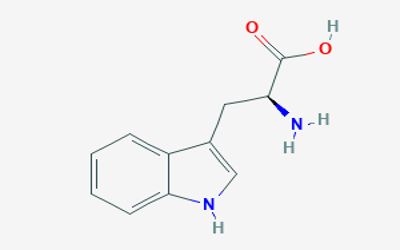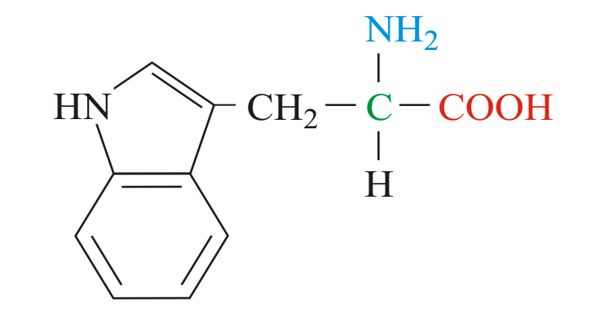Tryptophan is an essential amino acid that cannot be produced by the human body and must be obtained through your diet, primarily from animal or plant-based protein sources. It is encoded by the codon UGG. It is an α-amino acid used in the biosynthesis of proteins. It was discovered in the early 1900s after it was isolated from casein, a protein found in milk. It is an amino acid needed for normal growth in infants and for the production and maintenance of the body’s proteins, muscles, enzymes, and neurotransmitters.
Tryptophan is a naturally-occurring essential amino acid, which has been advocated as an innocuous health food for the treatment of depression, insomnia, stress, behavioral disorders, and premenstrual syndrome.
Tryptophan has an α-amino group (which is in the –NH3+ form under biological conditions), and an α-carboxylic acid group (which is in the deprotonated –COO− form under biological conditions). There are two types of tryptophan: L-tryptophan and D-tryptophan. The only difference between the two types is the orientation of the molecule. It also has a side chain indole, which makes it a non-polar aromatic amino acid.

Tryptophan is essential to humans: the body cannot synthesize it, so it must be got from the diet. It has the lowest concentration in the body of amino acids, yet, it is vital for a wide variety of metabolic functions that affect your mood, cognition, and behavior. This means your body cannot produce it, so you must get it from your diet. It is an essential amino acid, meaning that humans and certain other animals cannot synthesize it and must obtain it from their diets.
The liver can also use tryptophan to produce niacin (vitamin B3), which is needed for energy metabolism and DNA production. In order for tryptophan in the diet to be changed into niacin, the body needs to have enough: Iron, Riboflavin, Vitamin B6, etc. It is commonly used to treat insomnia and sleep disorders like sleep apnea, however, there’s not enough evidence to determine whether this is an effective use. Tryptophan can have plenty of health benefits, but the supplement can cause a number of unpleasant side effects in people.
Tryptophan plays a role in the production of serotonin, a mood stabilizer, melatonin, which helps regulate sleep patterns, niacin or vitamin B-3, and nicotinamide also known as vitamin B-6. It is also a precursor to the neurotransmitters serotonin and melatonin. Melatonin helps regulate the sleep-wake cycle, and serotonin is thought to help regulate appetite, sleep, mood, and pain.
Information Source:
















